Aucun résultat

Marc Fabian obtained his PhD from York University, Toronto, Canada. He completed post-doctoral training with Dr. Nahum Sonenberg (McGill University) where he investigated how microRNAs post-transcriptionally regulate gene expression. Specifically, he focused on investigating how microRNAs inhibit the translation and subsequently promote the degradation of target mRNAs. In 2013, he joined the Lady Davis Institute for Medical Research as an independent investigator and obtained an Assistant Professor position in the Department of Oncology, McGill University.
Understanding the molecular mechanisms that govern mRNA translation and stability in different biological contexts and how these mechanisms can become dysregulated in diseases is of critical importance. This is true now more than ever as mRNA-based vaccines and therapeutics enter the clinic. The central theme of my research program is the role of RNA-binding proteins in the post-transcriptional regulation of gene expression in mammalian cells. With my expertise in mRNA translation and turnover, RNA granules, miRNA biogenesis and miRNA-mediated gene silencing, I am leading a research program focusing on how protein-RNA and protein-protein interaction networks coordinate mRNA translation and decay in human cells.
My laboratory uses a multidisciplinary approach that encompasses cellular and molecular biology, animal models and genome-wide approaches to study how RNA binding proteins post-transcriptionally regulate gene expression in mammalian cells. The overall goal of my research program is to ultimately use the knowledge we have acquired to develop novel molecular tools and identify and target aberrant gene regulatory networks in human disease.
Pelletier D, Sabbaghian N, Chong AL, Priest JR, Elsheikh Ahmed Y, Fox GP, Fabian MR, Foulkes WD. (2024) Virchows Arch, doi: 10.1007/s00428-024-03759-y.
Sharma S, Kajjo S, Harra Z, Hasaj B, Delisle V, Ray D, Gutierrez RL, Carrier I, Kleinman C, Morris Q, Hughes TR, McInnes R and Fabian MR*. (2023) Genes & Development, 37(15-16):760-777.
Brothers WR, Ali F, Kajjo S and Fabian MR*. (2023) The EMBO Journal, Aug 25:e113933.
Pelletier D, Chong AL, Wu M, Witkowski L, Albert S, Sabbaghian N, Fabian MR* (co-corresponding) and Foulkes WD. (2023) NAR Cancer, 5(3):zcad030.
Pelletier D, Rivera B, Fabian MR and Foulkes WD. (2023) Trends in Genetics, 39(5):401-414.
Brothers WR, Fakim H, Kajjo S and Fabian MR*. (2022) Nucleic Acids Research, 50(13):7623-7636.
Kajjo S, Sharma S, Chen S, Brothers WR, Cott M, Hasaj B, Jovanovic P, Larsson O and Fabian MR*. (2022) The EMBO Journal, 15;41(6):e108650.
Fakim H and Fabian MR*. (2021) Methods in Molecular Biology, 2209:333-345.
Brothers WR, Hebert S, Kleinman CL and Fabian MR*. Elife, 9:e54995.
Rivera B, Nadaf J, Fahiminiya S, Apellaniz-Ruiz M, Saskin A, Chong AS, Sharma S, Wagener R, Revil T, Condello V, Harra Z, Hamel N, Sabbaghian N, Muchantef K, Thomas C, de Kock L, Hébert-Blouin MN, Bassenden AV, Rabenstein H, Mete O, Paschke R, Pusztaszeri MP, Paulus W, Berghuis A, Ragoussis J, Nikiforov YE, Siebert R, Albrecht S, Turcotte R, Hasselblatt M, Fabian MR and Foulkes WD. (2020) Journal of Clinical Investigation, 130(3):1479-1490.
Fakim H and Fabian MR*. (2019) Advances in Experimental Medicine and Biology, 1203:149-164.
Fabian MR*. (2019) The EMBO Journal, 38(13):e102477.
Apellaniz-Ruiz M, Segni M, Kettwig M, Glüer S, Pelletier D, Nguyen VH, Wagener R, López C, Muchantef K, Bouron-Dal Soglio D, Sabbaghian N, Wu MK, Zannella S, Fabian MR, Siebert R, Menke J, Priest JR, Foulkes WD. (2019) The New England Journal of Medicine, 380(19):1834-1842.
Duchaine TF* and Fabian MR*. (2019) Cold Spring Harbor Perspectives in Biology, 11(3):a032771.